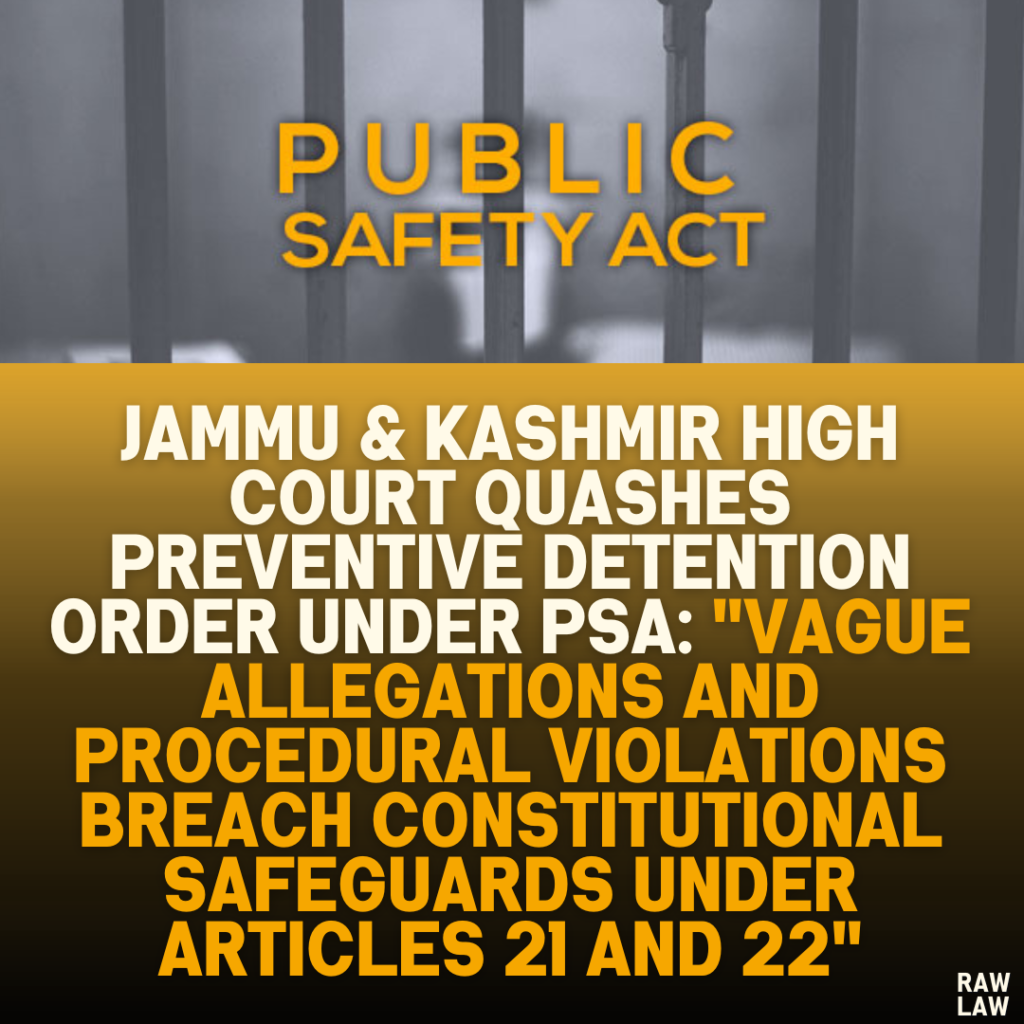Court’s Decision
The Jammu & Kashmir High Court quashed the preventive detention order dated July 13, 2024, issued under the Jammu & Kashmir Public Safety Act, 1978 (PSA), against the detenue. The court held that the detention order violated constitutional safeguards under Articles 21 and 22. The grounds for detention were deemed vague, illusory, and unsupported by concrete evidence, resulting in a lack of proper subjective satisfaction. Consequently, the court ordered the detenue’s immediate release unless required in connection with another case.
Facts
- Arrest and Detention:
- The detenue was arrested during the night of July 13-14, 2024, by police without informing the family of the reasons.
- He was detained under Section 8 of the PSA on allegations of activities prejudicial to the state’s security.
- The grounds of detention were neither provided to the detenue nor his family at the time of arrest. Later, a copy of the detention order was handed over by the Superintendent of District Jail, Kathua.
- Representation and Allegations:
- The detenue’s wife submitted a representation to the Principal Secretary, Home Department, and the District Magistrate, Srinagar, contesting the detention order.
- The grounds of detention accused the detenue of:
- Being influenced by the ideologies of a senior advocate alleged to have secessionist tendencies.
- Organizing seminars and supporting anti-national elements.
- These allegations were vague, unsupported by specific incidents, dates, or evidence.
- Health Concerns:
- The detenue was undergoing treatment for a medical condition (Crohn’s disease), which added a humanitarian dimension to the challenge against his detention.
Issues
- Did the detaining authority satisfy the requirement of subjective satisfaction in issuing the detention order?
- Was the detenue provided with sufficient material to enable an effective representation as mandated by Article 22(5) of the Constitution?
Petitioner’s Arguments
- Lack of Specificity:
- The detention order was vague and lacked specific dates, incidents, or evidence to substantiate the allegations.
- The grounds of detention were based on conjecture, making it impossible for the detenue to mount an effective defense.
- Violation of Procedural Safeguards:
- The detaining authority failed to supply vital documents, including the dossier that formed the basis of the detention.
- This omission violated Article 22(5), which requires all relevant material to be supplied to the detenue for effective representation.
- Non-Application of Mind:
- The detention order was issued in a mechanical manner without due diligence.
- There was no live or proximate link between the detenue’s alleged past conduct and the need for preventive detention.
- Health Grounds:
- Detaining the detenue in adverse conditions could exacerbate his medical condition, violating humanitarian principles.
Respondent’s Arguments
- Threat to State Security:
- The respondents argued that the detenue’s actions posed a direct threat to the state’s security, warranting preventive detention.
- Credible intelligence suggested that the detenue organized activities promoting secessionism and terrorism.
- Subjective Satisfaction:
- The detention order was based on the detaining authority’s subjective satisfaction, derived from credible sources and technical inputs.
- Compliance with Procedure:
- The respondents claimed that the detention order complied with constitutional safeguards.
- The detenue was informed of his right to make a representation, which was duly considered and rejected.
Analysis of the Law
- Articles 21 and 22 of the Constitution:
- Article 21 protects life and personal liberty, while Article 22 provides safeguards against arbitrary detention.
- Preventive detention laws must strictly adhere to these constitutional mandates to ensure procedural fairness.
- Judicial Precedents:
- Khudiram Das v. State of West Bengal (1975): Emphasized the need for procedural safeguards, including specific and clear grounds of detention.
- Ameena Begum v. State of Telangana (1987): Highlighted the necessity of a live and proximate link between past conduct and the need for preventive detention.
- Jaseela Shaji v. Union of India (2024): Held that non-supply of material relied upon by the detaining authority invalidates the detention order.
- Live and Proximate Link:
- The court noted that the allegations against the detenue were based on stale and vague incidents, lacking a live and proximate link to justify preventive detention.
- Role of the Advisory Board:
- The Advisory Board failed to adequately scrutinize the detention order, which is a critical safeguard under preventive detention laws.
Precedent Analysis
The court applied established principles from the above cases:
- Preventive detention must be based on specific, relevant, and timely material.
- Vague and illusory grounds render the detention order unconstitutional.
- The detaining authority’s failure to provide adequate material to the detenue undermines the fairness of the process.
Court’s Reasoning
- Vague Grounds of Detention:
- The court found that the grounds were not specific and lacked details regarding dates, incidents, or evidence.
- Allegations such as the detenue’s association with certain individuals were insufficient to justify detention without substantive proof.
- Non-Application of Mind:
- The detaining authority acted mechanically, relying on irrelevant and extraneous material.
- The absence of a proper subjective satisfaction invalidated the detention order.
- Procedural Violations:
- The detenue and his family were not provided with essential material, making it impossible to mount an effective defense.
Conclusion
The court held that:
- The detention order violated the constitutional safeguards under Articles 21 and 22.
- The grounds of detention were vague, illusory, and unsupported by evidence.
- The procedural lapses and non-application of mind rendered the detention order invalid.
- The detenue was ordered to be released forthwith unless required in another case.
Implications
This judgment reaffirms the judiciary’s commitment to safeguarding individual liberty against arbitrary executive actions. It underscores the importance of adhering to procedural safeguards in preventive detention cases, ensuring that such measures are not misused. The decision also highlights the need for detaining authorities to act with due diligence and accountability when exercising such powers.
